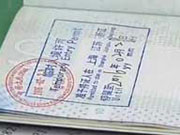China rolls out 144-hour visa-free policy

 0 Comment(s)
0 Comment(s) Print
Print E-mail CNTV, March 1, 2016
E-mail CNTV, March 1, 2016
The Chinese government has introduced a new 144-hour transit policy for international travelers. February 29th marks the end of the first month of the policy's implementation. But how is it being received by visitors, and what issues have hindered them in benefiting from this policy?
The newly released policy allows qualified visitors to spend 6 days in the Yangtze River Delta, an economic powerhouse in China, without first obtaining a visa.
Peter is coming for an job interview at China Eastern Airlines. Thanks to the reminder from his potential employer, a visa is no longer an obstacle preventing him from getting the job.
Over 2,000 visitors have benefited from this policy already since its implementation on January 30th.
"Due to the Chinese new year holiday, only 40-50 foreigners applied for the 144-hour transit each day. The number has reached 70-80 after the holiday. We expect more transit visitors as more foreigners get to know about this policy," Gong Jun, inspector with China Immigration Inspection of Shanghai Airport, said.
Visitors from 51 countries and regions can benefit from this policy, including the United States, Russia, Britain, Australia, France and Japan.
Citizens from the listed countries and regions can transfer in certain Chinese entry points.
"Visitors must enter and leave Chinese mainland through one of the listed ports, and stay in the Yangtze Delta region, including Shanghai, Zhejiang and Jiangsu Province, for less than 144 hours. Once we had an application featuring accommodation in Guangdong Province. We had to reject this application and let the visitor change his itinerary before entering the Chinese mainland," Gong said.
Passengers applying for this 6-day visa free transit must provide valid international travel documents, onward trip tickets and itineraries on paper upon arrival, similar to previous transit visa application.
The prolonged duration and extended range is aiming at encouraging the arrival of more tourists, as well as facilitating extra commercial, intellectual and trading cooperation.





